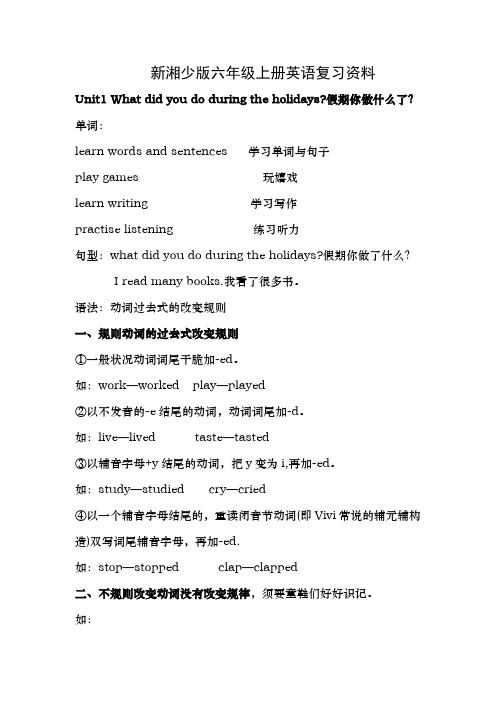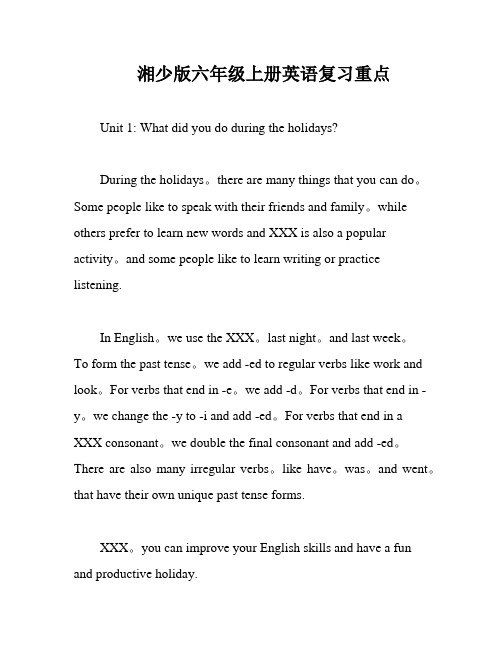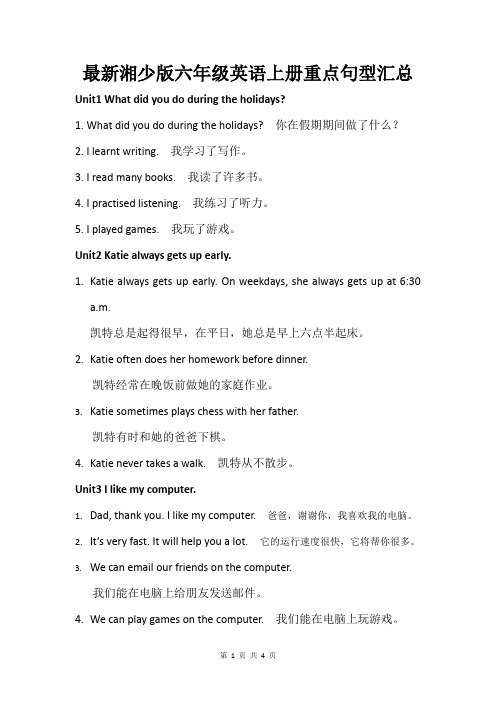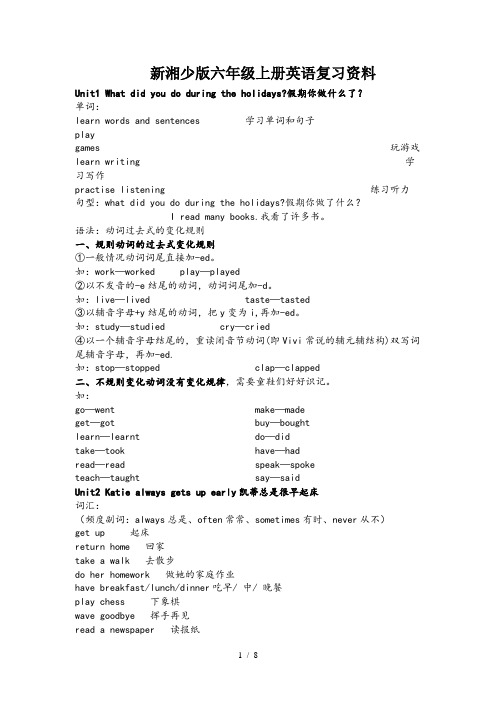最新湘少版六年级上册英语复习重点
新湘少版六年级上册英语复习资料全

新湘少版六年级上册英语复习资料Unit1 What did you do during the holidays?假期你做什么了?单词:learn words and sentences 学习单词与句子play games 玩嬉戏learn writing 学习写作practise listening 练习听力句型:what did you do during the holidays?假期你做了什么?I read many books.我看了很多书。
语法:动词过去式的改变规则一、规则动词的过去式改变规则①一般状况动词词尾干脆加-ed。
如:work—worked play—played②以不发音的-e结尾的动词,动词词尾加-d。
如:live—lived taste—tasted③以辅音字母+y结尾的动词,把y变为i,再加-ed。
如:study—studied cry—cried④以一个辅音字母结尾的,重读闭音节动词(即Vivi常说的辅元辅构造)双写词尾辅音字母,再加-ed.如:stop—stopped clap—clapped二、不规则改变动词没有改变规律,须要童鞋们好好识记。
如:go—went make—made get—got buy—bought learn—learnt do—didtake—took have—had read—read speak—spoke teach—taught say—saidUnit2 Katie always gets up early凯蒂总是很早起床词汇:(频度副词:always总是、often经常、sometimes有时、never 从不)get up 起床return home 回家take a walk 去漫步do her homework 做她的家庭作业have breakfast/lunch/dinner吃早/ 中/ 晚餐play chess 下象棋wave goodbye 挥手再见read a newspaper 读报纸be late for school 上学迟到句型:Peter always gets up at 7:00 a.m。
湘少版六年级上册英语复习重点

湘少版六年级上册英语复习重点Unit 1: What did you do during the holidays?During the holidays。
there are many things that you can do。
Some people like to speak with their friends and family。
while others prefer to learn new words and XXX is also a popular activity。
and some people like to learn writing or practice listening.In English。
we use the XXX。
last night。
and last week。
To form the past tense。
we add -ed to regular verbs like work and look。
For verbs that end in -e。
we add -d。
For verbs that end in -y。
we change the -y to -i and add -ed。
For verbs that end in aXXX consonant。
we double the final consonant and add -ed。
There are also many irregular verbs。
like have。
was。
and went。
that have their own unique past tense forms.XXX。
you can improve your English skills and have a fun and productive holiday.During the holidays。
I XXX by train and bus。
最新湘少版六年级英语上册重点句型汇总(全册)

最新湘少版六年级英语上册重点句型汇总Unit1 What did you do during the holidays?1. What did you do during the holidays? 你在假期期间做了什么?2. I learnt writing. 我学习了写作。
3. I read many books. 我读了许多书。
4. I practised listening. 我练习了听力。
5. I played games. 我玩了游戏。
Unit2 Katie always gets up early.1.Katie always gets up early. On weekdays, she always gets up at 6:30a.m.凯特总是起得很早,在平日,她总是早上六点半起床。
2.Katie often does her homework before dinner.凯特经常在晚饭前做她的家庭作业。
3.Katie sometimes plays chess with her father.凯特有时和她的爸爸下棋。
4.Katie never takes a walk. 凯特从不散步。
Unit3 I like my computer.1.Dad, thank you. I like my computer. 爸爸,谢谢你,我喜欢我的电脑。
2.It’s very fast. It will help you a lot. 它的运行速度很快,它将帮你很多。
3.We can email our friends on the computer.我们能在电脑上给朋友发送邮件。
4.We can play games on the computer. 我们能在电脑上玩游戏。
第1 页共1 页。
湘少版本小学六年级的上册的英语总结复习重点.doc

WORD格式小学英语六年级(上)复习资料Unit 1 What did you do during the holidays?●词汇 :holiday 假期 during 在 ... 期间learn words and 学习单词和句playsentences 子gameslearn 学习写practise 练习听力writing 作listening你在假期都做些什么?speak 说玩游戏●语法 : 一般过去时:表示过去某个时间里发生的动作或状态过去时判断标志:句子中有表示过去的时间。
yesterday 昨天 yesterday morning昨天早上the day before yesterda last night前天昨晚last week 上周last month 上个last justyear 去年now刚才月two days ago 两天前 in 等, .1990+ 动词过去.构成:主语式动词过去式的变化规则:1. 直接加ed : work—worked look—looked2.以不发音 e 结尾的单词,直接加d:live lived hope---hoped---use--- used3. 以辅音字母+y结尾y 为 i加的,变ed:study—studied carry—carriedworry—worried+ed: stop — stopped 4. 以重读闭音节结尾且末尾只有一个辅音字母的,双写最后的辅音字母 plan — planned; 重读闭音节体现形式为辅- 元 - 辅结构,例如nod,n为辅音,o为元音,d为辅音。
5. 以 ic结尾的动词,要ic变成再加ed,如→ picnicked,把ick picnic traffic→ trafficked6.不规则变化的动词过去式:have- am/is- was are- ge--- g ot fe ---felt go---went drink----- had -- -- were t say--- said el do/does---did drank eat--ate broughbring---- tthink- thought bought caught taugh--- buy---- catch---- teach---- twear-- wore cut---- cut swept sleep —----slept see-- sweep sawsitbecome-- read-- ----- became -- read - sat●语言结构:What did you do during the holidays?专业资料整理WORD格式I read many books.I wrote a little storybook.◆乘坐某种交通工具“ by+交通工具的名称” 如:乘火车by train乘公共汽车by bus但是,有一个特殊,步行on footUnit 2 Katie always gets up early.凯蒂总是很早起床。
湘少版六年级上册英语复习核心知识

湘少版六年级上册英语复习核心知识本文档旨在为六年级上册英语研究提供核心知识的复指南。
以下是需要重点复的内容:Unit 1: Greetings- 问候语:Hello, Hi, Good morning, Good afternoon, Good evening, How are you?- 回应问候:I'm fine, thank you. And you?- 自我介绍:My name is... I'm from...- 人称代词:I, you, he, she, it, we, theyUnit 2: Classroom Objects- 文具:pen, pencil, book, eraser, ruler, crayon- 研究用品:desk, chair, blackboard- 询问物品:What's this? It's a...- 形容词:big, small, long, short- 数字:one, two, three, four, five, six, seven, eight, nine, tenUnit 3: My Family- 家庭成员:father, mother, brother, sister, grandfather, grandmother- 家庭关系:This is my.../These are my...- 形容词性物主代词:my, your, his, her, its, our, theirUnit 4: Daily Routine- 动词:get up, wash face, brush teeth, have breakfast, go to school, have lunch, go home, do homework, have dinner, go to bed- 副词:early, late- 一般现在时:I get up at...Unit 5: Food and Drinks- 食物:apple, banana, sandwich, pizza- 饮品:water, juice, milk- 询问喜好:Do you like...? Yes, I do. / No, I don't.- 表达喜好:I like... / I don't like...Unit 6: Weather- 天气:sunny, cloudy, rainy, windy, snowy- 问天气:How's the weather today? It's...- 回答天气:It's sunny/cloudy/rainy/windy/snowy.以上是六年级上册英语复的核心知识点。
湘少版六年级英语上册全册知识点汇总

湘少版六年级英语上册全册知识点汇总Unit 1一、核心词汇★★★1.动词: learn学习practise练习speak说2.名词: holiday假日;假期3.介词: during 在....期间二、了解词汇★★1.动词: ring响2.名词: bell铃3.疑问副词: why为什么三、核心句型★★★1. I read many books during the holidays.我在假期里读了很多书。
解读:此句是一个含有一般过去时的陈述句。
一般过去时表示过去某时发生的动作或状态,常和表示过去的时间状语连用。
举一反三: I visited my uncle. 我看望了我的叔叔。
I went to the park last Sunday. 我上周日去公园了。
2. - What did you do during the holidays? 你在假期里做了什么?- I learnt writing. 我学习写作了。
解读:问句是一般过去时的特殊疑问句。
答语为一般过去时的陈述句。
举一反三: - What did you do yesterday? 你昨天做什么了?- I played with my friends. 我和我的朋友们玩了。
3. Why didn't you run around the tree? 你为什么不绕着树跑?解读:此句是一个一般过去时的特殊疑问句,why为特殊疑问词,意为“为什么”,用于向对方询问原因,一般要用“Because ..”来回答。
举一反三: Why didn't you go out to play? 你为什么没有出去玩?四、了解句型★★1,The students are talking about their holidays.学生们正在讨论他们的假期。
解读:此句是一个现在进行时的陈述句。
现在进行时表示正在进行或发生的动作。
举一反三: He is watching TV.他正在看电视。
新湘少版六年级上册英语复习资料

新湘少版六年级上册英语复习资料Unit1 What did you do during the holidays?假期你做什么了?单词:learn words and sentences 学习单词和句子playgames 玩游戏learn writing 学习写作practise listening 练习听力句型:what did you do during the holidays?假期你做了什么?I read many books.我看了许多书。
语法:动词过去式的变化规则一、规则动词的过去式变化规则①一般情况动词词尾直接加-ed。
如:work—worked play—played②以不发音的-e结尾的动词,动词词尾加-d。
如:live—lived taste—tasted③以辅音字母+y结尾的动词,把y变为i,再加-ed。
如:study—studied cry—cried④以一个辅音字母结尾的,重读闭音节动词(即Vivi常说的辅元辅结构)双写词尾辅音字母,再加-ed.如:stop—stopped clap—clapped二、不规则变化动词没有变化规律,需要童鞋们好好识记。
如:go—went make—madeget—got buy—boughtlearn—learnt do—didtake—took have—hadread—read speak—spoketeach—taught say—saidUnit2 Katie always gets up early凯蒂总是很早起床词汇:(频度副词:always总是、often常常、sometimes有时、never从不)get up 起床return home 回家take a walk 去散步do her homework 做她的家庭作业have breakfast/lunch/dinner吃早/ 中/ 晚餐play chess 下象棋wave goodbye 挥手再见read a newspaper 读报纸be late for school 上学迟到句型:Peter always gets up at 7:00 a.m。
湘少版小学英语六年级复习知识点

湘少版小学英语六年级复习知识点TYYGROUP system office room 【TYYUA16H-TYY-TYYYUA8Q8-湘少版(湖南少年儿童出版社出版)小学英语教材知识点,使用湘教版小学英语教材六年级的老师应该用得着,这些知识点还是很全面的,希望对您有所帮助。
1.字母:(大小)辨认、书写顺序;元音字母:A a , Ee, Ii, Oo, Uu2. 数字:1~999的基数词和序数词的运用,如计算、购物、时间、日期等。
句型:①What's your number?②What’s the time?③How many pens are there?④How old are you?⑤How much is it?⑥How tall are you?⑦How heavy are you⑧What time do you get up?⑨When's your birthday?⑩What time did you see him?3. 颜色:单词:red, pink, yellow, brown, blue, purple, orange, black, white, green.句型:①What colour is it②What’s your favourite colour?4. 时间:年、季节、月、星期、日、时刻:Season( spring, summer, autumn, winter)Month: January, February, March, April, May, June, July, August, September, October, November, December.Week:Sunday, Monday, Tuesday, Wednesday, Thursday, Friday, Saturday. Day:1st May (the first of May), May 2nd ( May the second)句型:见话题2。
- 1、下载文档前请自行甄别文档内容的完整性,平台不提供额外的编辑、内容补充、找答案等附加服务。
- 2、"仅部分预览"的文档,不可在线预览部分如存在完整性等问题,可反馈申请退款(可完整预览的文档不适用该条件!)。
- 3、如文档侵犯您的权益,请联系客服反馈,我们会尽快为您处理(人工客服工作时间:9:00-18:30)。
最新教学资料·湘少版英语小学英语六年级(上)复习资料Unit 1 What did you do during the holidays? 你在假期都做些什么?●词汇:holiday 假期during 在...期间speak 说learn words and sentences 学习单词和句子play games 玩游戏learn writing 学习写作practise listening 练习听力●语法:一般过去时:表示过去某个时间里发生的动作或状态过去时判断标志:句子中有表示过去的时间。
yesterday昨天yesterday morning昨天早上the day before yesterda前天last night 昨晚last week上周last month上个月last year去年just now刚才two days ago两天前in 1990 等…..构成:主语+动词过去式动词过去式的变化规则:1.直接加ed:work—worked look—looked2.以不发音e结尾的单词,直接加d:live---lived hope---hoped use---used3.以辅音字母+y结尾的,变y为i加ed:study—studied carry—carried worry—worried4.以重读闭音节结尾且末尾只有一个辅音字母的,双写最后的辅音字母+ed:stop—stopped plan—planned;重读闭音节体现形式为辅-元-辅结构,例如nod,n为辅音,o为元音,d为辅音。
5.以ic结尾的动词,要把ic变成ick再加ed,如picnic→picnicked,traffic→trafficked6.不规则变化的动词过去式:have---had am/is---was are---were get---got say---said feel---felt do/does---did go---went drink---drank eat--ate bring----broughtthink----thought buy----bought catch----caught teach----taughtwear----wore cut----cut sweep----swept sleep—slept see----sawbecome----became read----read sit----sat●语言结构:What did you do during the holidays?I read many books.I wrote a little storybook.◆乘坐某种交通工具“by+交通工具的名称” 如:乘火车by train 乘公共汽车by bus 但是,有一个特殊,步行on footUnit 2 Katie always gets up early.凯蒂总是很早起床。
●词汇:weekday平日get up起床wash face洗脸make the bed铺床have breakfast吃早餐wake up醒来always总是,一直usually通常often经常sometimes 有时never 从不every day每天late 迟的,晚的be late for school上学迟到family家庭wave 挥手go to school去上学go to bed上床睡觉do her homework做她的家庭作业read a newspaper 看报纸play chess 下棋take a walk 走路return返回early 早的hurt 伤害scientist科学家●语法:一般现在时。
一般现在时:表示经常性习惯性动作.当主语是第三人称单数的时候,谓语动词也要用第三人称单数形式。
●动词第三人称单数的构成:⑴一般的在动词末尾加s. 如:get→gets run→runs make→makes⑵以“s”,“x”,“ch”,“sh”,或“o”结尾的,加es.如:wash→washes go→goes⑶以辅音字母加y结尾的动词,改y为i,再加es. 如:try→tries have→has●语言结构:Katie always gets up early every day.He usually waves them goodbye.英语中,表示在具体的某个时刻前,必须加介词“at” 如:在六点钟at six o’clockUnit3 I like my computer.我喜欢我的电脑。
●词汇:email my friends给朋友发邮件send greetings送去问候search for a lot of things 查找许多东西find out about countries 发现国家world 世界interesting 有趣的●语法:can的用法:can 作为情态动词,后面直接加动词原型,表示“会、能”,例如:I can swim.我会游泳。
Unit4 The Mid-Autumn Festival is coming.中秋节到了。
●词汇:the Mid-Autumn Festival中秋节centre 中心mooncake月饼nuts坚果lotus seed莲子red bean 红豆nearby 附近type 类型taste 尝起来bright 明亮的even 甚至poem诗歌●语法:1.enjoy/like doing sth. 喜欢(享受)做某事2.现在进行时:表示现在正在进行的动作。
构成:am /is /are + 动词现在分词现在分词是由动词原形加ing构成。
现在分词一般构成规则如下:(1)一般在动词末尾直接加ing. 如: read读→readingplay玩→playing sleep睡觉→sleeping listen听→listeningcry哭→crying eat吃→eating(2)辅音字母+e去e,再加ing. 如: write写→writing bite咬→biting(3)重读闭音节(结尾辅元辅wxy除外),双写再加ing.如:sit坐→sitting swim游泳→swimming run跑→runningam /is /are的选择,请记住下面的口诀:我用am; 你用are; is连着他,她,它; 单数is复数are..也就是I am; You are; He is; She is; It is; We are; You are; They areUnit5 It will be sunny and cool tomorrow.明天天气将会晴朗凉爽。
●词汇:weather forecast天气预报light rain 小雨heavy rain 大雨strong wind 大风light snow 小雪sunny and cool 晴朗凉爽sunny and warm 晴朗温暖soft温和的storm暴风雨●句型:It will/won’t be.....There will/won’t be......●语法:一般将来时:表示将来某一时刻的动作或状态,或将来某一段时间内经常的动作或状态。
常常和表示将来的时间状语连用。
如:tomorrow(明天),next week(下周);in the future(将来)等。
构成:1.will+动词原型It will rain.It will be rainy.It will be a rainy day.There will be sunny tomorrow.2.be going to +动词原型:用来表示事先考虑过的将要发生的动作以及已有迹象表明必将要发生的某事,意为“打算;就要”Dongdong is going to buy an iPhone6.Unit6 I will bring a big bottle of orange juice.我将会带一大瓶橙汁。
●词汇:a bottle of orange juice 一瓶橙汁 a box of cakes 一盒蛋糕a few cans of Coke 一些听装可乐a few bars of chocolate 一些条状巧克力bring 带来meet 遇见peanut 花生fruit 水果candy 糖果wait 等待cookie 曲奇饼干radio 无线收音机volleyball 排球●句型:I will +动词原型●语法:可数名词和不可数名词数量的表示方法不可数名词的数量表示方法:前面加量词,如 a bar of 一条;a piece of 一张,一片;a bottle of 一瓶;a cup of 一杯等,数量体现在量词上面two bars of 两条;some pieces of 许多张,许多片;three bottles of 三瓶;many cups of 许多杯等Unit7 What can I do?我能做什么?●词汇:slow迟缓的, weak虚弱的,an old woman一个老妇人,help old people on the road 帮老人过马路,make tea沏茶,make cakes做蛋糕,clean their homes打扫房间,make them happy让他们开心,one another彼此,free免费,Ms已婚和未婚的女士均可用●句型:What can I do ?I can +动词原型I can help sb to do sth.●语法:情态动词can有一定的词义,但不能独立存在,它必须与动词原形一起构成谓语。
情态动词can没有人称和数的变化。
其具体用法如下:1.表示"能、会",指脑力或体力方面的"能力"。
例如:I can speak English.我会讲英语。
2.表示"可能",常用于否定句或疑问句中,指某种可能性。
3.例如: Can he come here today, please?请问他今天能到这里来吗?4.表示"可以",常用于口语中,指许可或请求做某事。
例如:Can I have a cup of tea, please?请问我可以喝一杯茶吗?You can go out.你可以出去了?Unit8 We shouldn’t wast e water.我们不应该浪费水。
●词汇:waste浪费,blouse女士上衣,enough充足的,world世界,save节约,drop一点(滴),fresh 新鲜的,keep the rivers clean保持河流清洁,keep the air clean and fresh保持空气清新,plant more tree 植更多的树,use bikes instead of cars用自行车代替小汽车,shouldn’t kill wild animals禁止捕杀野生动物,shouldn’t waste water禁止浪费水,shouldn’t litter禁止乱扔垃圾,exercise锻炼●句型:We should +动词原型我们应该...●语法:should/shouldn’t do sth. 应该/不应该做某事Unit9 This bird is bigger than the first one.这只鸟比第一只鸟大。
